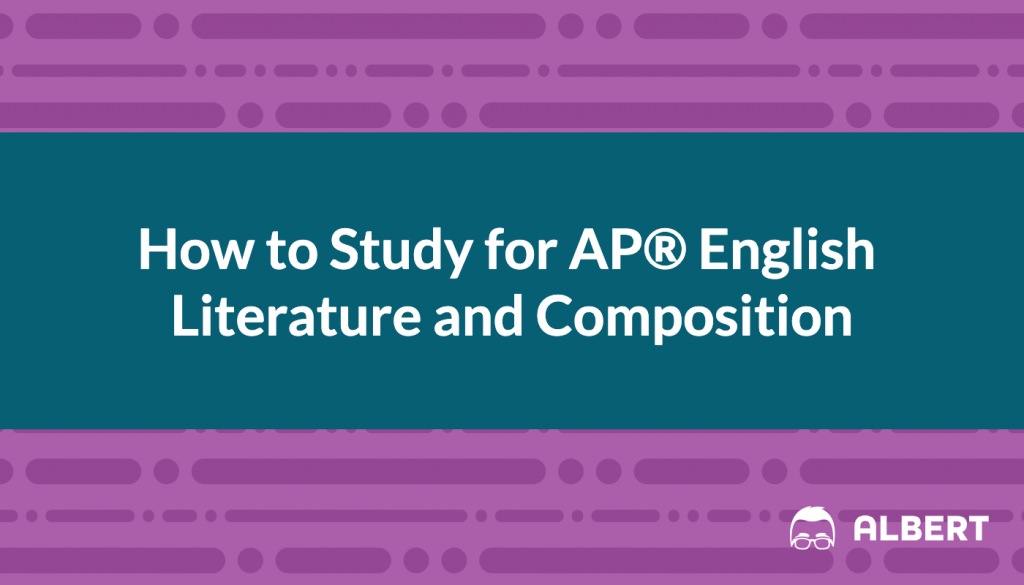While all AP® courses are challenging, how to study for the AP® English Literature and Composition exam is especially hard to determine. Unlike other AP® courses, the study of English literature can be a much more personal journey. You also may not have the opportunity to read all of the texts that may be included in the examination materials.
English literature is a vast topic, encompassing all works written in English regardless of the nationality of the author. Texts include works of fiction and prose, as well as poetry. Plays, such as the work of William Shakespeare, are studied, as well as more modern selections.
Topics covered can range a number of time periods, and often represent the sentiment of the era. In fact, many works are considered controversial today based on the subject of discussion. Some pieces are even included in the infamous “banned books” list due to certain content.
But don’t let the size of the subject intimidate you. It will take some time and effort to properly prepare, but it can be accomplished with thorough planning. So, if you feel ready to begin your journey to AP® English Literature and Composition examination glory, prepare yourself for this adventure.

How to Study for AP® English Literature: What’s on the AP® English Literature Exam
To create an effective AP® English Lit study guide from which to work, you need to understand how the exam works as well as what will be covered. The format of the exam is determined by the College Board. This means it will have the same format regardless of where you take the exam. The content is standardized based on the material that can be included, but the questions may vary over time.
AP® English Literature and Composition Format
The structure of the exam is simple. It is divided into two sections and is three hours long in total. The first section is multiple-choice, consists of 55 questions, and makes up 45 percent of your total score. Many of the questions will refer to specific written pieces, and excerpts will be included in the exam materials. You will have one hour to complete this section.
Section two is the free-response section of the exam, and requires written essay-style answers. You will be given three writing prompts which includes one from each of the following categories:
• An analysis of a provided poem
• An analysis of a provided piece of prose fiction
• An analysis of a given topic that is based on a text of your choosing that possess literary merit
Since the written portion of the exam is considered challenging, you are given two hours to complete this section.
Understanding the Learning Objectives in AP® English Literature
Now that you have an overview of the exam structure, you won’t be surprised when your exam day comes. To prepare yourself for the content, you need to review the information designated within the learning objectives for the course.
The primary objective of the course is to provide high school students access to college-level coursework. Those who complete the exam successfully will be awarded with college credit for their efforts.
The College Board course description contains a number of specific goals based on the intensive study of written works across multiple genres and periods. The works studied are considered to possess literary merit, and open the opportunity for further analysis and repeated enjoyment by the reader. While the course does focus on reading, it also encourages discussion and examination through written responses to key points within the work.
A Focus on Reading
While it is no surprise that a course about literature would focus on reading, there is more to the course than that. You will learn to read actively and thoroughly, making sure you recognize how the words are used and why they were selected. Additionally, you will spend a notable amount of time considering and analyzing the works. This will help you achieve a deeper level of understanding as well as make a connection through personal interpretation.
Pieces are examined for meaning as well as for artistry. How words are used to create a particular feeling within the reader is examined with the same fervor as the other aspects of the work. Additional attention is paid to how the piece reflects the societal norms of its period, as well as any historical context it provides.
All of these aspects are considered when conducting an analysis. You will learn how to take contextual information and combine it with careful observation to make connections toward an interpretive conclusion.
This sounds more complicated than it is. Essentially, you will be given works to read and will have the opportunity to interpret what is being said by the author. Some pieces may be fairly straightforward while others depend greatly on the point-of-view of the reader. This means that multiple responses to a question may be functionally true, depending on your perspective. This means many assignments do not inherently have a right or wrong answer. Instead, you will be graded based on how you came to your conclusion, how well it is supported, and the quality of your response.
College-Level Writing

While much of the academic focus on the AP® English Lit course is on reading, writing is also an important part of the class and exam. You will learn skills to help you create a written analysis of selected works, with special focus on the following writing styles:
• Expository
• Analytical
• Argumentative
You will learn how to structure assignments in order to provide the support to your point of view. Attention is paid to how the pieces are organized, and how one idea connects to the next. Further, sentence structure is reviewed for appropriate construction.
Creative writing is explored to help you experiment with the various techniques demonstrated by notable authors. This helps give you an appreciation for the skill required to create a great piece of English literature. You will explore concepts pertaining to tone and voice to make sure the perspective is appropriately maintained. Additionally, you will learn to write with illustrative detail to help bring life to your work.
Expansion of Vocabulary
Since the intent of the AP® English Literature course is to mimic college conditions, your vocabulary will grow to meet the demands of the selected text. You will be introduced to terms that are not commonly used today, but were common in other time periods, as well as encounter words that are not often spoken. By taking advantage of the advanced exposure, your language skills will improve.
How to Study for AP® English Literature and Composition: Gathering Your Materials
Determining which materials are essential to your study of English literature is one of the biggest challenges you will face during the course. While your teacher will require an examination of certain works, the number of representative texts is vast. The College Board does not dictate a set of required texts. Instead, they recommend a number of authors considered to be appropriate representatives within their genres.
To select the ideal materials, you should first consider what is assigned within the class, as well as what you have read previously. Texts assigned through your AP® English Literature class will require special attention. You may only need to briefly revisit texts that you have read previously.
Once those items have been assessed, you can continue with the following resources for additional guidance.
College Board Materials for AP® English Literature and Composition
• AP® English Literature and Composition Course Description – A full review of the courses goals, requirements, and recommendations.
• AP® English Literature and Composition Course Overview – An overview of the course content and exam format, including a sample question.
• AP® English Literature and Composition Reading Study Skills – An overview of recommended techniques for advancing your reading study skills.
• AP® English Literature and Composition Writing Study Skills – An overview of recommended techniques for improving your writing study skills.
Online Educational Resources for AP® English Literature and Composition
A selection of free resources to help you focus on specific skills
• Khan Academy-Grammar – A variety of free courses regarding grammar and the English language.
• Coursera – Access to college course material from renown universities from around the world.
Albert.io AP® English Literature and Composition Guide and Posts
We have a large variety of information and posts available covering many of your most pressing questions and topics. Here are a few to get you started:
• 15 Must Know Rhetorical Terms for AP® English Literature
• AP® English Literature Book List: 5 Essential Reads
• The Ultimate AP® English Literature Reading List
How to Study for AP® English Literature and Composition: Practice Tests and Exam Skills
While building a foundation of knowledge on the subject of English literature is critical to your success in the course, it can only do so much to prepare you for the exam. By taking practice exams, you can hone the skills you need to perform at your best in your exam.
Practice Tests
Before you can take a practice test, you need access to some material. Sample questions can be found through Albert.io. The College Board has also released some exams that can be used to replicate the full test experience.
• Guide to AP® English Literature Multiple Choice Questions – A selection of questions based on works of recognized literary merit.
• Guide to AP® English Literature Free Response Prompts – Writing prompts styled after the free response questions traditionally found in the exam.
• AP® English Literature and Composition Released Exams – Previous exams that have been released to the public to function as supplemental materials for instruction on the topic as well as running as practice tests.
To make the most of your practice test experience consider replicating the conditions you will face when you take the official test. Give yourself an appropriate time limit based on the exam standards. Allow yourself a break in between sections to stretch and relax.
If time expires before you complete either section, take the time to finish the remaining questions at a later time. That way you can benefit from the experience while keeping the testing conditions realistic. Be sure and mark the last question completed during the allotted time for consideration at a later time.
Scoring Your Practice Exams
Scoring the multiple choice section is fairly cut and dry; you were either right or wrong. Mark every incorrect response to help guide your studies down the road, and note the correct answer to help make the appropriate mental connections. It is significantly more challenging to score your free response essays.
Exam Skills
Having the required knowledge and ability is only part of the test-taking experience. You also need to hone skills in areas like time management and stress reduction. By completing a practice test under realistic conditions, any issues in these areas will be exposed. This allows you to include them when reflecting back on the experience and integrate them into your lessons learned.
How to Study for AP® English Literature and Composition: Learn from Your Mistakes

Once you have scored your practice exams, you are prepared to take that information to guide your study efforts. This can include correcting issues in language use or writing technique, as well as provide indications as to the kinds of written works you should review on your own time.
When determining your next steps, there are three major categories to consider for improvement.
Issues of Timing
One benefit of timing your practice exam is that you can identify any issues related to time management. For the multiple choice section, consider which questions may have taken more time and try to determine why. In some cases, you may find certain provided passages more difficult to interpret, which may have slowed your response in the entire section. At other times, you may identify areas in which you need a better understanding to feel more confident in your responses.
Often, issues of timing are more noticeable in the free response portion. If you found yourself rushing to meet the time requirement, you need to examine why you felt rushed. If a particular topic took a disproportionate amount of time, you can focus additional study in that area to compensate.
If you felt confident about your responses, but did not have the time to complete your answers, then time management is key. You should dedicate time to learning how to efficiently structure your responses based on the allotted time. This includes eliminating superfluous information and creating concise, but thorough, responses.
Stress Management
It is easy to become overwhelmed by the stress associated with studying for and taking the AP® English Literature and Composition exam. Not only can this increase feelings of anxiety, it also makes it more difficult to focus and can negatively affect your score.
Remember that some nervousness is to be expected. It is a perfectly normal feeling that most people experience during exams.
To help keep stress at a minimum level, eat a well-balanced diet to give your body the nutrition it needs to function well. Make sure you get enough sleep, especially on the night before the exam, and maintain proper hydration.
If you find yourself becoming stressed or anxious while taking the exam, use the following relaxation techniques to bring your stress levels down:
• Focus on positive thoughts, such as, “I studied hard for this exam, so I am prepared to do well.”
• Reframe anxiety as excitement to change your mindset
• Regularly pause to relax your shoulders and release tension in your abdomen
• Don’t forget to breathe
• Read all directions and passages slowly to avoid unnecessary rushing
• Focus on the questions you know
• Skip any questions that have you stumped and come back to them at the end
By taking a few moments to manage your feelings of stress and anxiety, you can keep them from overwhelming you.
Once the section is complete, or the exam is over, do not focus on what you did or did not do. Instead, set those feelings aside for now. Worrying about things that cannot be changed will just increase your anxiety, and offers you no benefit.
Incorrect Responses
Understanding the nature of your incorrect responses is also valuable. Was your answer wrong because you didn’t understand the material? Were you rushing and misread the question? Was a key word not part of your vocabulary?
When evaluating your incorrect multiple choice responses, look for indications of a pattern that could indicate an area of weakness in your knowledge base. Then use the information to focus your studies on those areas.
If an incorrect response was due to misreading the question, you may have rushed through the material. While working quickly can help ensure you can complete all of the questions, you don’t want to miss answers by rushing. This is often an issue of time or stress management and not ignorance regarding the material.
How to Study for AP® English Literature and Composition: Dedicating the “Right” Amount of Time
Figuring out how much time should be dedicated to studying is difficult. This is especially true for AP® English Lit, since so much of the course is focused on time spent reading. If you are looking for some guidelines to determine how much time you should dedicate, consider the following tips.
Use Your Current Grade as a Guide
If you are taking the AP® course, you can use your current grade as a guide. While your current grade is not a guarantee of a corresponding score on the exam, you can use it to consider how your study habits translate into an improved performance.
For those struggling in the class, you should dedicate more time to your studies. Not only will your grade in class likely improve, raising your grade point average, but you will also be more likely to retain the kind of information you need in order to perform well in the exam. If test anxiety is a main factor, then spend more time simulating test conditions and practice stress management techniques. If your writing is subpar, consider taking a separate writing course online through one of the free sites recommended for study materials.
In cases where your grade is high, and you feel comfortable with the technical aspects in the course, consider dedicating more time to reading works that are recommended for the class, but not included in your required reading. This gives you a larger knowledge base to work from, especially for the free response exam questions.
Review the Scoring Rubric
The free response essays are scored based on a standard metric, as provided in the materials section of this article. By familiarizing yourself with those requirements, you will know if you should dedicate more time to improving your writing skills.
You can practice your writing skills by answering practice questions that you find online, or working with a teacher for some alternatives. Focus on creating a system to write concise, but thorough answers that are well written. Spend time improving the quality of your writing, and not the quantity.
Fit in More Reading
With the prevalence of e-readers and reading apps, finding time to squeeze in a little more reading is often easy. Consider taking time between classes to read a few pages, or enjoy a chapter at lunch. If you take the bus to and from school, read while you are on the road.
You can even switch out your music for audio books. Instead of working out to your usual playlist, try listening to a recommended book. You can also do the same while driving your car, or any time you might walk around with your headphones on. While listening may not provide the same experience as reading the material, it provides more information than not doing it at all.
How to Study for AP® English Literature and Composition: Studying Mistakes

While knowing how to study is important, knowing what not to do can be just as valuable.
The Movie is NOT the Same as the Book
Some students think that they can save time by watching the movie instead of reading the book. While that may seem like a good idea, many movies deviate notably from their written counterparts. That is true of movies based on modern novels as well as those based on classics.
Even if a movie stays fairly true to the book, the content must be cut down in order to meet an appropriate movie length. This means that information available in the book may not be shown in the movie. For brevity, some movies have different characters perform certain actions than do in the book. This can lead to confusion if you forget which character actually did the act in the book instead of the movie.
Only Reading the Study Guides
There are a variety of “study guides” available in your local bookstore or online. Some students believe they can gain the same amount of knowledge by only reading these materials, and skipping the actual book.
While you will not experience the level of inaccuracy as the movie-watching shortcut, your education will be incomplete. These study guides center on key points that are commonly examined in traditional classwork, but may not cover all of the information that may be covered in an AP® exam.
Further, some study guides are skewed based on the most common analysis of a text. Even if it is an interesting and logical conclusion, it will not help you improve your critical thinking skills. This makes the exam more challenging as you are somewhat unfamiliar with the process of discovering these ideas on your own.
Not Studying Based on Priority
Your studies should be focused on the areas that are most important regardless of other factors. Don’t waste time reviewing information you already know thoroughly. Focus your efforts on the parts in which you are weak, or where you could use additional understanding.
Always Cramming
Many students don’t study; they cram. Instead of trying to review all of the information right before a test, consider spending a small amount of time every day. Try to read just one chapter, or review one key topic, every day. If you have time for more, great! If not, you are spreading out the work and giving yourself an opportunity to truly absorb the material.
Wrapping Up
Now that you know what to expect from the AP® English Literature course, you are prepared to study more effectively. You can create a study plan that helps you cover all of the required material, as well as choose supplemental works to improve your knowledge of the subject.
One important thing to remember is you are not alone in your journey. The study materials recommended during this article will guide your efforts. You can also work directly with your teacher to look at additional areas of concern, as well as how to improve your current skills.
Yes, the study of literature is time intensive. Yes, it leaves a lot of room for interpretation. It can also be a wonderful exploration into the worlds created by some of the most notable authors across many eras. Take your time and let these pieces speak to you. You may be surprised by what you discover.
Looking for AP® English Literature practice?
Kickstart your AP® English Literature prep with Albert. Start your AP® exam prep today.









2 thoughts on “How to Study for AP® English Literature and Composition”
What is exactly is your program? Is it a study guide for kids or an online tutorial the teacher could infuse in the classroom? Cost?
It’s both! Aligned practice for students independently and a rich resource for teachers to complement the instruction in their classroom. If you’d like to know more, check out a video tour of Albert. Please click here or the Schools button at the bottom of this page and we can send you prices for the 2016-2017 school year.
Comments are closed.